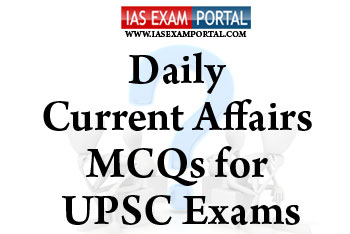(HOT) UPSC Current Affairs 2025 PDF
NEW! The Gist (OCT-2025) | E-BOOKS
Current Affairs MCQ for UPSC Exams - 23 January 2020

Current Affairs MCQ for UPSC Exams - 23 January 2020
Q1. With respect to GM cotton production in India, which of the following statements stands true ?
1) India is a signatory to international treaties on GMO regulation (the
Convention on Biological Diversity, and the Cartagena Protocol on Biosafety),
which specifically provide for inclusion of socioeconomic considerations in GMO
risk assessment.
2) India is the only country that grows cotton as hybrids and the first to
develop hybrid cotton back in 1970.
3) Cotton is a dryland crop and 65% of area under cotton in India is rain-fed.
a) 1 & 2 only
b) 2 & 3 only
c) 1 & 3 only
d) all of the above
answer : d
Q2. Which of the following diseases can be classified as zoonotic diseases ( spread from animals to human beings ) ?
1) Small pox
2) Corona virus
3) Bird flu
4) Cholera
5) Anthrax
a) 1,2 & 3 only
b) 2,3 & 4 only
c) 2,3 & 5 only
d) all of the above
answer : c
Q3. Which of the following statements regarding the recently released Standard Chartered SDG Investment Map stands true ?
1) India needs a whopping USD 2.64 trillion investment to meet the UN's
sustainable development goals (SDGs), offering the public sector an investment
opportunity of over USD 1.12 trillion by 2030.
2) The opportunity in the water and sanitation is USD 19.2 billion as 24 per
cent of the people still do not have access to clean water and sanitation and
closing this gap by 2030 will require investment of close to USD 20 billion,
said the report.
3) The greatest private sector opportunity in the country is investment in
achieving and maintaining universal access to electricity, which is the seventh
SDG.
a) 1 & 2 only
b) 2 & 3 only
c) 1 & 3 only
d) all of the above
answer : b
Q4. Which of the following statements regarding the recently published democracy index stands true ?
1) India was graded in electoral process and pluralism (8.67), government
functioning (6.79), political participation (6.67), political culture (5.63) and
civil liberties (6.76).
2) The Index also categorises India under “flawed democracies”, countries that
hold free and fair elections and where basic civil liberties are respected, but
have significant weaknesses in aspects of democracy, such as problems in
governance, an underdeveloped political culture and low levels of political
participation.
3) India’s overall score fell from 7.23 to 6.9, on a scale of 0-10, within a
year (2018-2019) — the country’s lowest since 2006.
a) 1 & 2 only
b) 2 & 3 only
c) 1 & 3 only
d) all of the above
answer :d
Q5. India in associated with which of the following countries recently to build the “Aurobindo Ashram school” at Thankot ?
a) Bangladesh
b) Nepal
c) Afghanistan
d) Myanmar
answer : b

